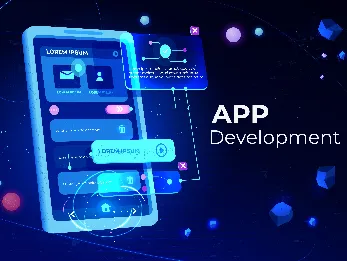Top Mobile App Development Framework You Need To Know In 2026
6 mins | 17 Feb 2026

Mobile applications have taken over the world, and it seems extremely difficult to function without mobile devices, as well as mobile apps nowadays! It's noticeable that the global app market is overflowing with mobile applications of different types, and taking mobile app development to a completely new height can be a daunting task in itself!
It might take a while for you all to contemplate which mobile app framework is great for your project, especially when there are a lot of options out there! But you don't have to worry at all, as we are here with a list of top mobile app frameworks that will ease your task of choosing the best one for your business!
Before we dive right into the list of top mobile app development frameworks, let us first understand what a mobile app framework exactly means, its advantages, and the different types of mobile app frameworks!
What Is Meant By A Mobile App Framework?
Businesses have certainly ascertained that incorporating mobile apps into their business is one of the best ways to make a good customer base! And as we all know, there’s never been an absence of an authentic application concept, right? Every single thing has acted its way up to gaining enough benefit from mobile app development.
Although one should possess excellent knowledge about developing an app, it's not too difficult as there are numerous app development frameworks for both iOS & Android. All you need to do is have an understanding of web-based programming languages such as JavaScript, CSS, or HTML.
So, a mobile app framework is referred to as a software developing platform that encompasses software & tools, debugging tools, compilers, programming interfaces, and many other things. Therefore, a web developer focuses on developing the source code of the application & the framework and then makes use of different elements to generate the mobile app for various mobile devices.
What Are The Different Types Of Mobile Apps Frameworks?
Different types of digital devices are accessible today by a huge number of individuals, such as iOS, Android, and Windows. Today, mobile applications come in various forms and sizes that cover a wide range of functionalities beyond specific areas like shopping or gaming. When considering how apps function on smartphones, mobile apps can generally be categorized into three groups, and they are as follows:
a) Native Apps — When it comes to native apps, they are specifically designed for certain operating systems like Windows, iOS, & Android. These apps tend to utilize device features that include GPS, RAM, camera, and many more.
b) Web Apps — A web app can be defined as software that is hosted remotely and accessed through a web browser. Some of the common examples include blogs, email services, online stores, instant messaging tools, auction platforms, and numerous other web-based applications that are quite popular.
Read More: Top 11 Web Development Frameworks
c) Hybrid Apps — Hybrid applications are the ones that operate quite similarly to other smartphone applications upon launch, but they are differentiated by the fact that they have a mix of elements from both native and web apps. Popular frameworks are often utilized in developing these versatile applications.
When it comes to native apps, they are considered the best quality applications in terms of functionality as well as aesthetics. Nevertheless, native application development is costly when compared to other types of applications. In addition, if you want to accomplish the target of acquiring the highest number of customer engagements, then it might be a little difficult!
Yes, this is so because of the different types of platforms and devices available out there! When facing financial constraints but having a goal of achieving a huge number of customers, it is common for an application development enterprise to choose cross or hybrid-platform application development technologies.
What Are The Benefits Of Mobile Development?
In today's world, there's a widespread enthusiasm and willingness to take up mobile applications to cater to personal needs, whether it's about organizing schedules, enhancing productivity, or simply for entertainment objectives. These mobile applications boast user-friendly interfaces, smooth performance, and customization to meet individual preferences.
Across the globe, several businesses are shifting towards developing mobile platforms to maintain competitiveness and boost efficiency! Here are a few advantages of mobile development applications for businesses that you must know about:
1) Promotes Profits — For any business, it is crucial to keep the costs in control when it comes to developing mobile applications! Introducing a mobile application alongside a responsive brand website is an effective tactic for increasing sales while improving the customer journey. Mobile apps facilitate more transactions due to their user-friendly interface, thereby enhancing the overall shopping experience.
2) Creates Brand Awareness and Recognition — Developing and launching impressive mobile applications is a great tool to display your brand’s strength and what it stands for! Mobile apps help strengthen the position of your brand and inform your customers. The more you can entice your customers to get involved in your brand through the app, the more likely they are going to trust you and engage with your brand.
Read More: Benefits of Web Application
3) Enhances Efficiency — Business applications are custom-made to suit the requirements of the business so that they can execute various functions, increase the productivity of employees, and result in higher returns on investments.
4) Increases Customer Engagement — Business apps that are tailor-made help in creating an explicit channel between the customers and the brand, which allows for direct and valuable communication.
5) Offers Value To Customers — Developing a customer loyalty program within your mobile application enables your customers to access their loyalty points or incentives directly through the mobile app, eliminating the need for the usage of conventional collection cards. This approach has the potential to drive increased app installations and facilitate repeat business.
Here’s The List Of Top Mobile Development Frameworks In 2026 That You Must Know About:
1) React Native
In 2018, Facebook introduced React Native, which is a JavaScript-based framework for app development. This mobile app framework became a favorite among mobile app developers across the world, with 42% regularly utilizing it! The popularity of this particular platform is due to its ability to enable mobile app developers to develop mobile apps & give them a native look & feel for Android & iOS mobile devices.
The standout feature of React Native is its cross-platform app development capability, which enables app developers to write code once and deploy it across different platforms. This efficiency makes it highly popular among app developers and business owners, especially startups. Its cost-effectiveness and time-saving nature empower startups to stay competitive in the market.
2) Mobile Angular UI
The Mоbile Аngulаr UI framework is built with AngularJs, Bootstrap, and HTML5. People who already know about AngularJS and Twitter Bootstrap can swiftly understand how to utilize Mobile Angular UI for app development. Essentially, this mobile UI framework introduces app development components that were absent in Bootstrap 3, such as switches, overlays, scrollable areas, sidebars, and many more. The primary libraries employed by Mobile Angular UI for modern web and mobile application development such as Fastclick.js and overthrow.js.
3) Xamarin
Xamarin, Microsoft's open-source framework for mobile applications, enables app developers to develop high-quality mobile apps across multiple platforms. It utilizes programming languages such as .NET and C# to empower developers in crafting top-tier mobile experiences. Apps that are rebuilt with Xamarin promote adaptable native performance, which results in delivering users a unique and seamless interaction.
App developers utilize Xamarin to create a comprehensive ecosystem encompassing APIs, backends, components, and many more. In addition, integrating various tools, libraries, and programming languages with Xamarin significantly helps in streamlining app development processes.
4) Native Script
Native Script is a popular framework for mobile app development that enables the generation of native applications for Android and iOS platforms by making use of a unified codebase. Rather than relying on web views to render the user interface, Native Script integrates native APIs through technologies such as SML, CSS, Angular, JS, Vue.js, and others. It makes sure to offer native-like performance for applications by making use of all Android and iOS APIs.
5) Corona SDK
Соrоnа SDK is а popular open-source, freely available mobile app development framework that allows app developers to come up with impressive gaming applications. This particular framework is created in the “Lua scripting language”, which is known for its lightweight nature, simplicity, and adaptability. It is one of the most favored tools for developing cross-platform mobile games accessible on iOS, Android, Nook, and many other platforms.
Read More: 7 Best Web Application Development Software
6) PhoneGap
Phonegap is another widely utilized mobile app development framework that functions across various platforms. It makes use of CSS3 and HTML5 as its core languages, which makes it adaptable to hardware elements such as GPS, camera, accelerometer, and more. This specific framework is quite simple to understand and enables app developers to build a single app that can be accessed via different types of devices.
7) Swiftic
Swiftic is a mobile app development framework that is designed exclusively for iOS applications! Its intuitive interface makes it easy to navigate across various platforms. With Swiftic, you will be receiving a 30-day money-back guarantee on all plans, plus a 6-month success guarantee. Isn't that great? And if you don't achieve the expected results, you'll be getting a complimentary service for six months.
8) Flutter
Flutter, a UI toolkit built by Google, allows app developers to create visually appealing and attractive, native-like apps across various operating systems as well as devices by utilizing a single codebase. Widgets are utilized within this open-source mobile app SDK to develop responsive mobile apps. This capability streamlines the process for developers to easily and effectively modify the existing applications and develop new ones within a shorter time frame.
9) Appcelerator Titanium
This mobile app development framework is open-source, and cross-platform which enables app developers to develop native applications for various platforms such as iOS, Android, and Windows by utilizing a single codebase. It utilizes Ally as well as built-in UI elements to simplify the process of app development and accelerate the development of user-friendly mobile applications.
Final Thoughts
Contemporary and progressive mobile application frameworks will continue to transform the digital world because customers tend to move forward, adapt, and demand more from your company. For the time being, you should focus on leveraging your capabilities and any opportunities that come your way to level up your game in the area of mobile app development! The above-mentioned mobile app frameworks will help you unlock many functionalities so that you can elevate your business’s online presence for the long term.
It's an unsaid thing that mobile app development is continuing to progress and transform every single day! From single-player applications to cross-platform applications, web developers can be seen integrating machine learning, AI (Artificial Intelligence), and IoT (Internet of Things) to provide a smooth and seamless experience to their users. Therefore, it's the perfect moment to initiate the development stage and bring your app ideas to actuality. However, it's essential to pinpoint your needs and carefully assess them in comparison to the available features because it enables you to make a well-informed choice.
Key Takeaways
- When it comes to mobile app developments, they tend to provide numerous built-in advantages, such as speed, effectiveness, & a bug-free environment.
- Utilizing mobile application frameworks demands a good knowledge of web-based languages so that an individual can develop impressive as well as high-performing applications.
- You can make use of various elements, such as compilers, toolkits, debugging tools, etc., to represent your mobile app on the intended device.
- You are free to collaborate with web developers or even hire them to build and market applications to draw in new customers.
Author

Share
Other Articles

Your Website is Invisible to AI - Here's the 7 Pillar Fix (2026 Guide)
10 mins : 18 Feb 2026

Why Understanding Local Users Was the Secret Behind UPL’s Global Digital Success
3 mins : 26 Nov 2025

How UPL Built a Unified Digital Identity Across 140 Countries – And What Brands Can Learn From It
3 mins : 26 Nov 2025











